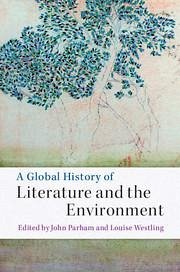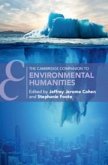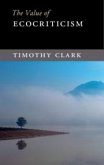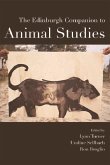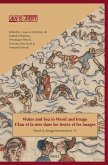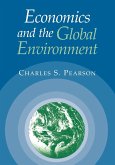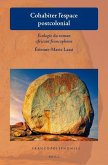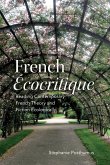A Global History of Literature and the Environment
Herausgeber: Parham, John; Westling, Louise
A Global History of Literature and the Environment
Herausgeber: Parham, John; Westling, Louise
- Gebundenes Buch
- Merkliste
- Auf die Merkliste
- Bewerten Bewerten
- Teilen
- Produkt teilen
- Produkterinnerung
- Produkterinnerung
This book offers a wide-ranging international history of environmental writing from ancient Mesopotamian and Asian works to the present.
Andere Kunden interessierten sich auch für
![The Cambridge Companion to Environmental Humanities The Cambridge Companion to Environmental Humanities]() The Cambridge Companion to Environmental Humanities116,99 €
The Cambridge Companion to Environmental Humanities116,99 €![The Value of Ecocriticism The Value of Ecocriticism]() Timothy ClarkThe Value of Ecocriticism63,99 €
Timothy ClarkThe Value of Ecocriticism63,99 €![The Edinburgh Companion to Animal Studies The Edinburgh Companion to Animal Studies]() The Edinburgh Companion to Animal Studies277,99 €
The Edinburgh Companion to Animal Studies277,99 €![Water and Sea in Word and Image / l'Eau Et La Mer Dans Les Textes Et Les Images Water and Sea in Word and Image / l'Eau Et La Mer Dans Les Textes Et Les Images]() Water and Sea in Word and Image / l'Eau Et La Mer Dans Les Textes Et Les Images115,99 €
Water and Sea in Word and Image / l'Eau Et La Mer Dans Les Textes Et Les Images115,99 €![Economics and the Global Environment Economics and the Global Environment]() Charles S. PearsonEconomics and the Global Environment64,99 €
Charles S. PearsonEconomics and the Global Environment64,99 €![Cohabiter l'Espace Postcolonial Cohabiter l'Espace Postcolonial]() Etienne-Marie LassiCohabiter l'Espace Postcolonial101,99 €
Etienne-Marie LassiCohabiter l'Espace Postcolonial101,99 €![French 'Ecocritique' French 'Ecocritique']() Stephanie PosthumusFrench 'Ecocritique'82,99 €
Stephanie PosthumusFrench 'Ecocritique'82,99 €-
-
-
This book offers a wide-ranging international history of environmental writing from ancient Mesopotamian and Asian works to the present.
Hinweis: Dieser Artikel kann nur an eine deutsche Lieferadresse ausgeliefert werden.
Hinweis: Dieser Artikel kann nur an eine deutsche Lieferadresse ausgeliefert werden.
Produktdetails
- Produktdetails
- Verlag: Cambridge University Press
- Seitenzahl: 459
- Erscheinungstermin: 1. Dezember 2016
- Englisch
- Abmessung: 242mm x 159mm x 31mm
- Gewicht: 757g
- ISBN-13: 9781107102620
- ISBN-10: 1107102626
- Artikelnr.: 47085304
- Herstellerkennzeichnung
- Libri GmbH
- Europaallee 1
- 36244 Bad Hersfeld
- gpsr@libri.de
- Verlag: Cambridge University Press
- Seitenzahl: 459
- Erscheinungstermin: 1. Dezember 2016
- Englisch
- Abmessung: 242mm x 159mm x 31mm
- Gewicht: 757g
- ISBN-13: 9781107102620
- ISBN-10: 1107102626
- Artikelnr.: 47085304
- Herstellerkennzeichnung
- Libri GmbH
- Europaallee 1
- 36244 Bad Hersfeld
- gpsr@libri.de
List of figures; List of contributors; Acknowledgments; Chronology;
Introduction Louise Westling and John Parham; Part I. Beginnings: 1. The
natural world in ancient Mesopotamian literature Stephanie Dalley; 2.
Environments of early Chinese and Japanese literatures Karen Thornber; 3.
The Garden of Eden in the Hebrew Bible Deborah Green; 4. Ecopoetics and the
literature of ancient India Murali Sivaramakrishnan; 5. Ancient Greek
literature and the environment: a case study with Pindar's Olympian 7 Chris
Eckerman; 6. 'Who shall be a sustainer?': maize and human mediation in the
Maya Popol Vuh Allen Christenson; 7. I invoke God, therefore I am: nature's
spirituality and its ecological impact in Islamic texts Sarra Tlili; Part
II. The Development of Humanism and the Industrial Age: 8. 'Viking'
ecologies: Icelandic sagas, local knowledge, and environmental memory
Steven Hartman, Reinhard Hennig and Astrid Ogilvie; 9. Human responses to
the environment in Medieval literature Gillian Rudd; 10. Remaking
eighteenth-century ecologies: arboreal mobility Elizabeth H. Cook; 11.
Romantic ecology, Aboriginal culture, and the ideology of improvement in
British Atlantic literature Kevin Hutchings; 12. Natural history in the
Anthropocene Laura Dassow Walls; 13. Bleak House, Liquid City, Climate to
Climax in Dickens Karen Chase and Michael Levenson; 14. Fantastic
metabolisms: a materialist approach to modern eco-speculative fiction Tom
Sykes; Part III. The Anthropocene: 15. Climate and culture in Australia and
New Zealand C. A. Cranston and Charles Dawson; 16. Modern English fiction
Kelly Sultzbach; 17. Ecological thought and literature in Europe and
Germany Hubert Zapf; 18. From birds and trees to texts: an ecosemiotic look
at Estonian nature writing Timo Maran and Kadri Tüür; 19. Contemporary
British poetry and the environment Leo Mellor; 20. Rescuing nature from the
nation: ecocritical (un)consciousness in modern Chinese culture Hangping
Xu; 21. Eating life at a contaminated table: the narrative significance of
toxic meals in contemporary Japan Yuki Masami; 22. Commodity frontiers,
Caribbean natures, and the aesthetics of ecological revolution in
Trinidadian literature Michael Niblett; 23. Petro-violence and the act of
bearing witness in contemporary Nigerian literature Byron
Caminero-Santangelo; 24. Black ants and bones: Nehruvian science and
third-world environment in the fiction of Satyajit Ray Upamanyu Pablo
Mukherjee; 25. Brazilian women poets on gender, nature, and the body Izabel
F. O. Brandão; 26. Can the environmental imagination save the world?
Lawrence Buell; Further readings; Index.
Introduction Louise Westling and John Parham; Part I. Beginnings: 1. The
natural world in ancient Mesopotamian literature Stephanie Dalley; 2.
Environments of early Chinese and Japanese literatures Karen Thornber; 3.
The Garden of Eden in the Hebrew Bible Deborah Green; 4. Ecopoetics and the
literature of ancient India Murali Sivaramakrishnan; 5. Ancient Greek
literature and the environment: a case study with Pindar's Olympian 7 Chris
Eckerman; 6. 'Who shall be a sustainer?': maize and human mediation in the
Maya Popol Vuh Allen Christenson; 7. I invoke God, therefore I am: nature's
spirituality and its ecological impact in Islamic texts Sarra Tlili; Part
II. The Development of Humanism and the Industrial Age: 8. 'Viking'
ecologies: Icelandic sagas, local knowledge, and environmental memory
Steven Hartman, Reinhard Hennig and Astrid Ogilvie; 9. Human responses to
the environment in Medieval literature Gillian Rudd; 10. Remaking
eighteenth-century ecologies: arboreal mobility Elizabeth H. Cook; 11.
Romantic ecology, Aboriginal culture, and the ideology of improvement in
British Atlantic literature Kevin Hutchings; 12. Natural history in the
Anthropocene Laura Dassow Walls; 13. Bleak House, Liquid City, Climate to
Climax in Dickens Karen Chase and Michael Levenson; 14. Fantastic
metabolisms: a materialist approach to modern eco-speculative fiction Tom
Sykes; Part III. The Anthropocene: 15. Climate and culture in Australia and
New Zealand C. A. Cranston and Charles Dawson; 16. Modern English fiction
Kelly Sultzbach; 17. Ecological thought and literature in Europe and
Germany Hubert Zapf; 18. From birds and trees to texts: an ecosemiotic look
at Estonian nature writing Timo Maran and Kadri Tüür; 19. Contemporary
British poetry and the environment Leo Mellor; 20. Rescuing nature from the
nation: ecocritical (un)consciousness in modern Chinese culture Hangping
Xu; 21. Eating life at a contaminated table: the narrative significance of
toxic meals in contemporary Japan Yuki Masami; 22. Commodity frontiers,
Caribbean natures, and the aesthetics of ecological revolution in
Trinidadian literature Michael Niblett; 23. Petro-violence and the act of
bearing witness in contemporary Nigerian literature Byron
Caminero-Santangelo; 24. Black ants and bones: Nehruvian science and
third-world environment in the fiction of Satyajit Ray Upamanyu Pablo
Mukherjee; 25. Brazilian women poets on gender, nature, and the body Izabel
F. O. Brandão; 26. Can the environmental imagination save the world?
Lawrence Buell; Further readings; Index.
List of figures; List of contributors; Acknowledgments; Chronology;
Introduction Louise Westling and John Parham; Part I. Beginnings: 1. The
natural world in ancient Mesopotamian literature Stephanie Dalley; 2.
Environments of early Chinese and Japanese literatures Karen Thornber; 3.
The Garden of Eden in the Hebrew Bible Deborah Green; 4. Ecopoetics and the
literature of ancient India Murali Sivaramakrishnan; 5. Ancient Greek
literature and the environment: a case study with Pindar's Olympian 7 Chris
Eckerman; 6. 'Who shall be a sustainer?': maize and human mediation in the
Maya Popol Vuh Allen Christenson; 7. I invoke God, therefore I am: nature's
spirituality and its ecological impact in Islamic texts Sarra Tlili; Part
II. The Development of Humanism and the Industrial Age: 8. 'Viking'
ecologies: Icelandic sagas, local knowledge, and environmental memory
Steven Hartman, Reinhard Hennig and Astrid Ogilvie; 9. Human responses to
the environment in Medieval literature Gillian Rudd; 10. Remaking
eighteenth-century ecologies: arboreal mobility Elizabeth H. Cook; 11.
Romantic ecology, Aboriginal culture, and the ideology of improvement in
British Atlantic literature Kevin Hutchings; 12. Natural history in the
Anthropocene Laura Dassow Walls; 13. Bleak House, Liquid City, Climate to
Climax in Dickens Karen Chase and Michael Levenson; 14. Fantastic
metabolisms: a materialist approach to modern eco-speculative fiction Tom
Sykes; Part III. The Anthropocene: 15. Climate and culture in Australia and
New Zealand C. A. Cranston and Charles Dawson; 16. Modern English fiction
Kelly Sultzbach; 17. Ecological thought and literature in Europe and
Germany Hubert Zapf; 18. From birds and trees to texts: an ecosemiotic look
at Estonian nature writing Timo Maran and Kadri Tüür; 19. Contemporary
British poetry and the environment Leo Mellor; 20. Rescuing nature from the
nation: ecocritical (un)consciousness in modern Chinese culture Hangping
Xu; 21. Eating life at a contaminated table: the narrative significance of
toxic meals in contemporary Japan Yuki Masami; 22. Commodity frontiers,
Caribbean natures, and the aesthetics of ecological revolution in
Trinidadian literature Michael Niblett; 23. Petro-violence and the act of
bearing witness in contemporary Nigerian literature Byron
Caminero-Santangelo; 24. Black ants and bones: Nehruvian science and
third-world environment in the fiction of Satyajit Ray Upamanyu Pablo
Mukherjee; 25. Brazilian women poets on gender, nature, and the body Izabel
F. O. Brandão; 26. Can the environmental imagination save the world?
Lawrence Buell; Further readings; Index.
Introduction Louise Westling and John Parham; Part I. Beginnings: 1. The
natural world in ancient Mesopotamian literature Stephanie Dalley; 2.
Environments of early Chinese and Japanese literatures Karen Thornber; 3.
The Garden of Eden in the Hebrew Bible Deborah Green; 4. Ecopoetics and the
literature of ancient India Murali Sivaramakrishnan; 5. Ancient Greek
literature and the environment: a case study with Pindar's Olympian 7 Chris
Eckerman; 6. 'Who shall be a sustainer?': maize and human mediation in the
Maya Popol Vuh Allen Christenson; 7. I invoke God, therefore I am: nature's
spirituality and its ecological impact in Islamic texts Sarra Tlili; Part
II. The Development of Humanism and the Industrial Age: 8. 'Viking'
ecologies: Icelandic sagas, local knowledge, and environmental memory
Steven Hartman, Reinhard Hennig and Astrid Ogilvie; 9. Human responses to
the environment in Medieval literature Gillian Rudd; 10. Remaking
eighteenth-century ecologies: arboreal mobility Elizabeth H. Cook; 11.
Romantic ecology, Aboriginal culture, and the ideology of improvement in
British Atlantic literature Kevin Hutchings; 12. Natural history in the
Anthropocene Laura Dassow Walls; 13. Bleak House, Liquid City, Climate to
Climax in Dickens Karen Chase and Michael Levenson; 14. Fantastic
metabolisms: a materialist approach to modern eco-speculative fiction Tom
Sykes; Part III. The Anthropocene: 15. Climate and culture in Australia and
New Zealand C. A. Cranston and Charles Dawson; 16. Modern English fiction
Kelly Sultzbach; 17. Ecological thought and literature in Europe and
Germany Hubert Zapf; 18. From birds and trees to texts: an ecosemiotic look
at Estonian nature writing Timo Maran and Kadri Tüür; 19. Contemporary
British poetry and the environment Leo Mellor; 20. Rescuing nature from the
nation: ecocritical (un)consciousness in modern Chinese culture Hangping
Xu; 21. Eating life at a contaminated table: the narrative significance of
toxic meals in contemporary Japan Yuki Masami; 22. Commodity frontiers,
Caribbean natures, and the aesthetics of ecological revolution in
Trinidadian literature Michael Niblett; 23. Petro-violence and the act of
bearing witness in contemporary Nigerian literature Byron
Caminero-Santangelo; 24. Black ants and bones: Nehruvian science and
third-world environment in the fiction of Satyajit Ray Upamanyu Pablo
Mukherjee; 25. Brazilian women poets on gender, nature, and the body Izabel
F. O. Brandão; 26. Can the environmental imagination save the world?
Lawrence Buell; Further readings; Index.

